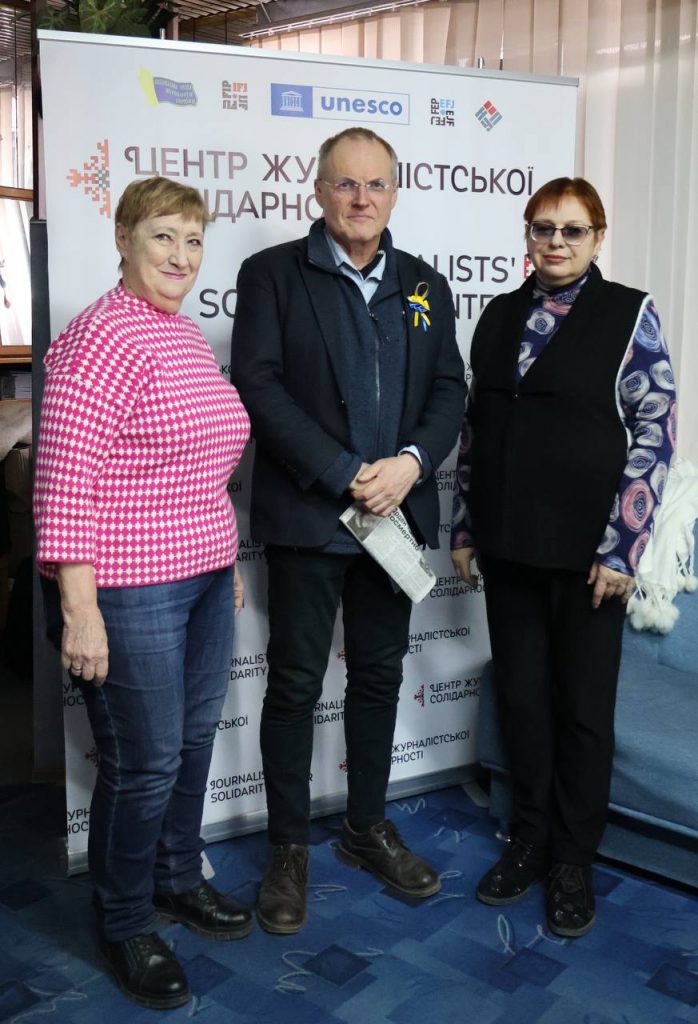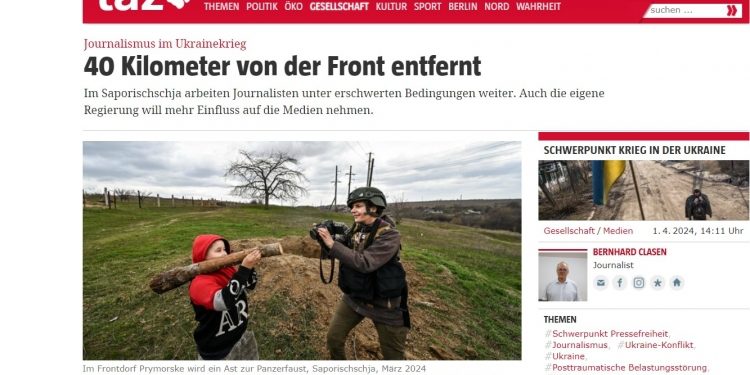In Zaporizhzhia, journalists continue to work in difficult conditions. The government also wants to have more influence on the mass media, German journalist Bernhard Clasen writes in the TAZ newspaper. This is what he published in the article Journalism In The Ukrainian War: 40 Kilometers From The Front in his media.
The office of the Zaporizhzhia Journalists’ Solidarity Center (JSC) is located in the very center of the southeastern Ukrainian city of Zaporizhzhia on Sobornyi Avenue. Local and displaced journalists from the occupied territories gather here for events, professional development, training sessions, and various first aid courses. In the Zaporizhzhia Region, 800 journalists are members of the National Union of Journalists of Ukraine (NUJU), under whose auspices the JSC works.
“Especially here, 40 km from the front, it is important that we journalists support each other,” explains Valentyna Manzhura, responsible secretary of the Ukrainian journalists’ union NUJU and one of the center’s two coordinators alongside Nataliya Kuzmenko, to TAZ.
“Anyone who has lost their house, their relatives, or is missing their husband is severely traumatized. And you have to help these journalists. Psychologically but also professionally. That means we help them not to lose their work, which is very fulfilling.” In the Zaporizhzhia Region, 800 journalists are members of the nationwide journalists’ union, under whose umbrella the JSC works.
Anyone who works as a journalist in the Zaporizhzhia Region doesn’t just need a phone, camera, and laptop. He or she will also need body armor, helmets, and a first aid kit. Domestic and foreign journalists can get all of this at the center of journalistic solidarity. The training events are also aimed at journalists who have to work during the war. There are courses on various related topics: how to collect information at the front, how to talk to traumatized people, and which regulations need to be observed.
Protective vests, helmets, first aid kits
Those who work in the Zaporizhzhia Region have different conditions than those experienced by journalists in Kyiv. Because all the journalists have worked here several times in helmets and protective vests. But even if you’re not at the front, you always have a free workstation in the center, with internet, a scanner, and a computer. The center has a dedicated Internet satellite connection and is therefore online 24 hours a day. Here, you can always find a conversation partner who competently answers questions, with whom you can exchange your experiences and talk about your problems.
Seventy percent of the Zaporizhzhia Region is occupied. Journalists still live there, too. But many managed to escape. And for them, the center is their first port of call after their escape. Here, they are helped to find accommodation and work. Manzhura believes no one should be forced to give up being a journalist for financial reasons. But we are also in contact with around 50 journalists who remained in the occupied territories. It is important for them to see that they are not forgotten.
The journalists of the JSC see themselves as reliable patriots of Ukraine. Nevertheless, there are situations in which they view the government or local rulers critically. For example, like the NUJU, they criticized the media law that came into force on March 31, 2023, which newly regulates the activities of the media.
On his Facebook page, the President of the NUJU, Sergiy Tomilenko, accused the bill of being “instruments of censorship” and a threat to freedom of information. It does limit the influence of the oligarchs on the media. At the same time, it gives President Volodymyr Zelenskyy a lot of power over the media, as it is his environment that decides on the composition of the media supervisory authority – the National Council for Television and Radio Broadcasting. So, Ukraine’s President can appoint four out of eight members of this Council. Parliament determines four more. In this, the Servant of the People presidential party has the majority.
However, Manzhura is confident: “We fought against the lack of freedom under former President Viktor Yanukovych. And that’s exactly why we don’t agree with the current rulers restricting freedom of speech.” Nevertheless, we have good contacts with MPs who are responsible for media legislation. And so, it is hoped that these contacts can be used to improve the current media law.

Threat to freedom of information
Solidarity work is not easy, says Manzhura. And we also depend on help and cooperation from outside. Colleagues from Norway and UNESCO are very grateful for their cooperation in recent years. The collaboration with the journalism faculty at the University of Zaporizhzhia has also proven to be very effective. Many lecturers from the university conduct further training courses in the center of journalistic solidarity. And that is a mutual give and take. During these courses, the lecturers also learn a lot about the practical work of journalists working during the war.
“We need contact and cooperation with journalists from other countries. On the one hand, we don’t want us and the war in Ukraine to slowly be forgotten. Through this collaboration, we want to draw more attention to our situation. And at the same time, we hope for support in expanding our technical capabilities. We need more technology, more protective equipment such as helmets and protective vests, and support with ongoing costs such as rent and municipal fees. But also medicine, clothing, and other essentials for our colleagues’ survival. In any case, we don’t get any real support from the state,” said the representative of Zaporizhzhia. journalists.
https://taz.de/Journalismus-im-Ukrainekrieg/!5998884/. The article in German is available at this link.
Call the Zaporizhzhia JSC at 096 277 5352 (Nataliya Kuzmenko and Valentyna Manzhura, the Zaporizhzhia JSC coordinators). The Center’s address is 152 Sobornyi Avenue.
ABOUT JSC
The Journalists’ Solidarity Centers is an initiative of the NUJU implemented with the support of the International and European Federations of Journalists and UNESCO. The initiative is designated to help media representatives working in Ukraine during the war. The Centers operate in Kyiv, Lviv, Ivano-Frankivsk, Chernivtsi, Zaporizhzhia, and Dnipro and provide journalists with organizational, technical, legal, psychological, and other types of assistance.
ABOUT UNESCO
UNESCO is the United Nations Educational, Scientific, and Cultural Organization. It contributes to peace and security by promoting international cooperation in education, sciences, culture, communication, and information. UNESCO promotes knowledge sharing and the free flow of ideas to accelerate mutual understanding. It is the coordinator of the UN Action Plan on the Safety of Journalists and the Issue of Impunity, which aims to create a free and safe environment for journalists and media workers, thus strengthening peace, democracy, and sustainable development worldwide. UNESCO is working closely with its partner organizations in Ukraine to provide support to journalists on the ground.
The designations employed and the presentation of material throughout this digest do not imply the expression of any opinion whatsoever on the part of UNESCO concerning the legal status of any country, territory, city, or area or its authorities or concerning the delimitation of its frontiers or boundaries.
The authors are responsible for the choice and the presentation of the facts contained in this digest and for the opinions expressed therein, which are not necessarily those of UNESCO and do not commit to the organization.
Zaporizhzhia JSC

 THE NATIONAL UNION OF
JOURNALISTS OF UKRAINE
THE NATIONAL UNION OF
JOURNALISTS OF UKRAINE
















Discussion about this post